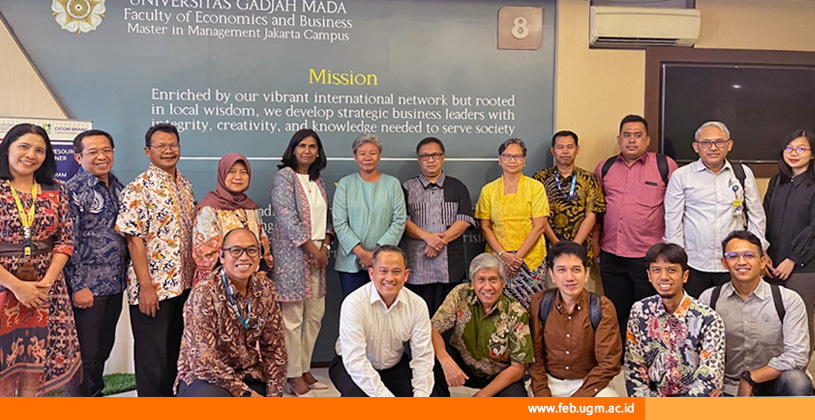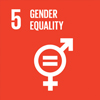Protection for Neglected Voices: Discussion on Creating a Safe Workplace
- Details
- Written by Adella
- Category: News
- Hits: 379

Friday (20/10), the Department of Management, Faculty of Economics and Business, Universitas Gadjah Mada (FEB UGM) held a focused group discussion event with the theme "Creating a Workplace Free of Violence and Harassment". This activity alligns with Sustainable Development Goals: Gender Equality (5); Decent Work and Economic Growth (8); Reduced Inequalities (10); Peace, Justice, and Strong Institutions (16); and Partnership for The Goals (17). This event explores issues related to creating a work environment free from violence and harassment. The event began with remarks by Prof. Dr. Eduardus Tandelilin, MBA, Director of Master of Management (MM) Jakarta Campus. He emphasized the critical role of campuses and academics in helping resolve one of the central issues in Indonesia, namely employment and human resources.
This activity was held at the Master of Management FEB UGM Jakarta Campus and was attended by various stakeholders. The Head of LM, Sari Sitalaksmi, acted as moderator in this event. Involving stakeholders from various sectors, it is hoped that they can formulate constructive solutions and recommendations to create a safe work environment and support employee rights. From academic circles, there was Kantha Dayaram, an Associate Professor from the University of Curtin, Australia. From the government side, there were Nurdin from the Ministry of Manpower; Dr. Ir. Lies Rosdianti, M.Sc., Head of Data and Information Bureau from the Ministry of Women's Empowerment and Child Protection (KPPPA); and Ir. Prijadi Santoso, M.Sc., Plt. Deputy Secretary for Protection of Women's Rights KPPPA.
Practitioner representatives also participated in this discussion. Myra M. Hanartani, SH, MA, (Chair of the Regulatory and Institutional Relations Committee of the Indonesian Employers' Association/ APINDO); Tina T. Kemala Intan, Reni Yustiani, and Endang Suraningsih (core management of Srikandi BUMN); Dharma Syahputra (Director of PT Kimia Farma, Tbk); Pambudi Sunarsihanto (Director of PT Kapal Api Global); and Miftahudin (Deputy of the Hajj Financial Management Agency).
The independent institutions were represented by Tiasri Wiandani, a commissioner from the National Commission for Women (Komnas) for Women. Trade unions also have a voice in this discussion, with the presence of Kun Wardhana, PhD, who serves as Director of UNI Global Union Asia and the Pacific, and Ir. Idrus, MM, who serves as Vice General Chair of the Confederation of All Indonesian Trade Unions (K-SPSI).
Violence and harassment in the workplace is something that is very common in various countries and must be taken seriously. In 2019, the International Labour Organization (ILO) established the Elimination of Violence and Harassment Convention No. 190 and ILO Recommendation No. 206. This Convention is the first international labour standard that seeks to protect workers and create a workplace of dignity and respect. As reference material, Prof. Kantha said that Australia had experienced a challenging ratification process.
Enforcement of rules and the participation of each stakeholder is the main challenge in protecting workers from this situation. Synchronization is an absolute requirement that must be carried out. Australia has been doing this continuously for almost 40 years, namely since the issuance of the Sex Discrimination Act in 1984. Even though it ratified it in mid-June 2023, Australia still has to work hard to prepare institutions and ecosystems before it is in force in June 2024.
ILO Jakarta has encouraged ratification efforts through outreach and education programs. Likewise, related ministries have issued various policies and regulations. From the corporate side, this movement has been responded to positively by the Ministry of State-Owned Enterprises (BUMN) by issuing a Respectful Workplace Policy. Trade unions also take a central and progressive role in responding to this; for example, the Global Asia and Pacific Union issued training guidelines for trade unions regarding this ILO convention.
Based on incidents of gender-based discrimination and violence against women in the workplace, Komnas Perempuan also conducted a review of the urgency of ratification. These efforts prove that creating a respectful and dignified workplace has become a common concern. In response to this, stakeholders took concrete action to combat it. However, it cannot be denied that the issue of violence and harassment will not immediately disappear from the world of work, so it continues to require consistency in preventing it.
Against this background, this FGD concludes the importance of creating a workplace ecosystem free from violence and harassment. The forum agreed that a robust ecosystem is supported by four pillars: regulatory synchronization, assistance and funding, cooperation with each stakeholder, and updating.
First, various worker protection policies have been issued but must be more synchronized. The effectiveness of labour protection regulations needs to pay attention to the entire process flow, starting from causal factors, such as weak primary education in schools/ families, government regulations related to employment, and company regulations; mitigation, such as continuous and consistent training, placing safe workplaces as management KPIs, and HR policies that are pro safe workplaces; to assistance to victims, such as efforts to report to the authorities, funding, and recovery of physical and mental health.
Second, serious attention is needed to assist and finance victims' efforts after incidents, such as seeking justice or treatment. The victim's psychological condition is barely protected during this process, so it often has fatal consequences. Agencies such as BPJS Health, LPSK, and APH (Law Enforcement Officials) are expected to have a more significant role.
Third, each stakeholder is expected to play a more active role. This means that stakeholder participation is not simply aimed at eliminating institutional obligations. Coordination between agencies at the central and regional levels is also vital. Issues such as the availability and capacity development of inspectors/ supervisors/ task forces need to be supported by adequate resources so that mitigation and handling can be carried out massively and systematically. This can be realized, one of which is through the education of trade unions to create effective collaboration.
Fourth, updating knowledge and effective mitigation against contemporary forms of violence is also essential. In the digital era, forms of violence are increasingly diverse. In response to this, relevant company regulations need to be implemented immediately.
Author : Sari Sitalaksmi, M.Mgt., Ph.D.
Editor : Adella Wahyu Pradita







